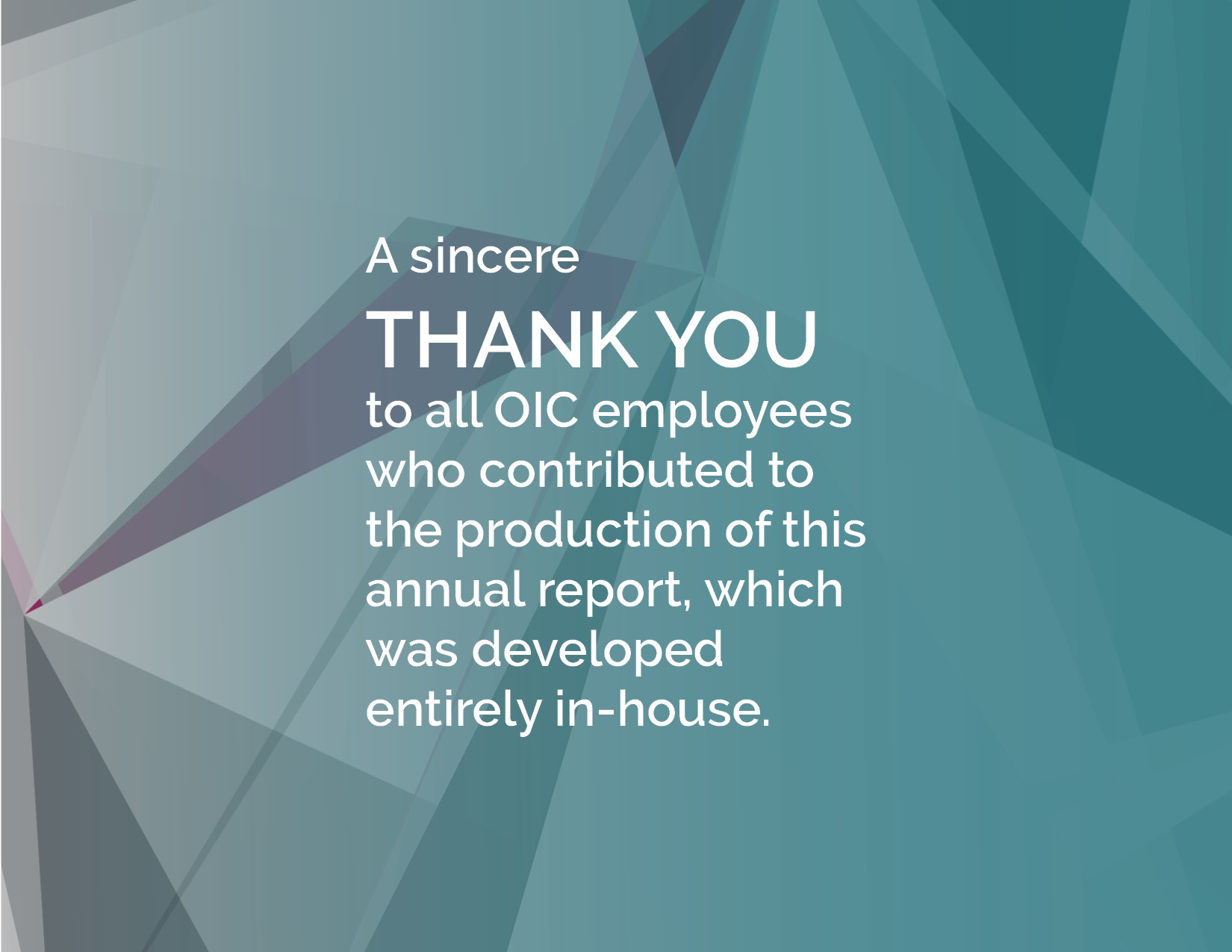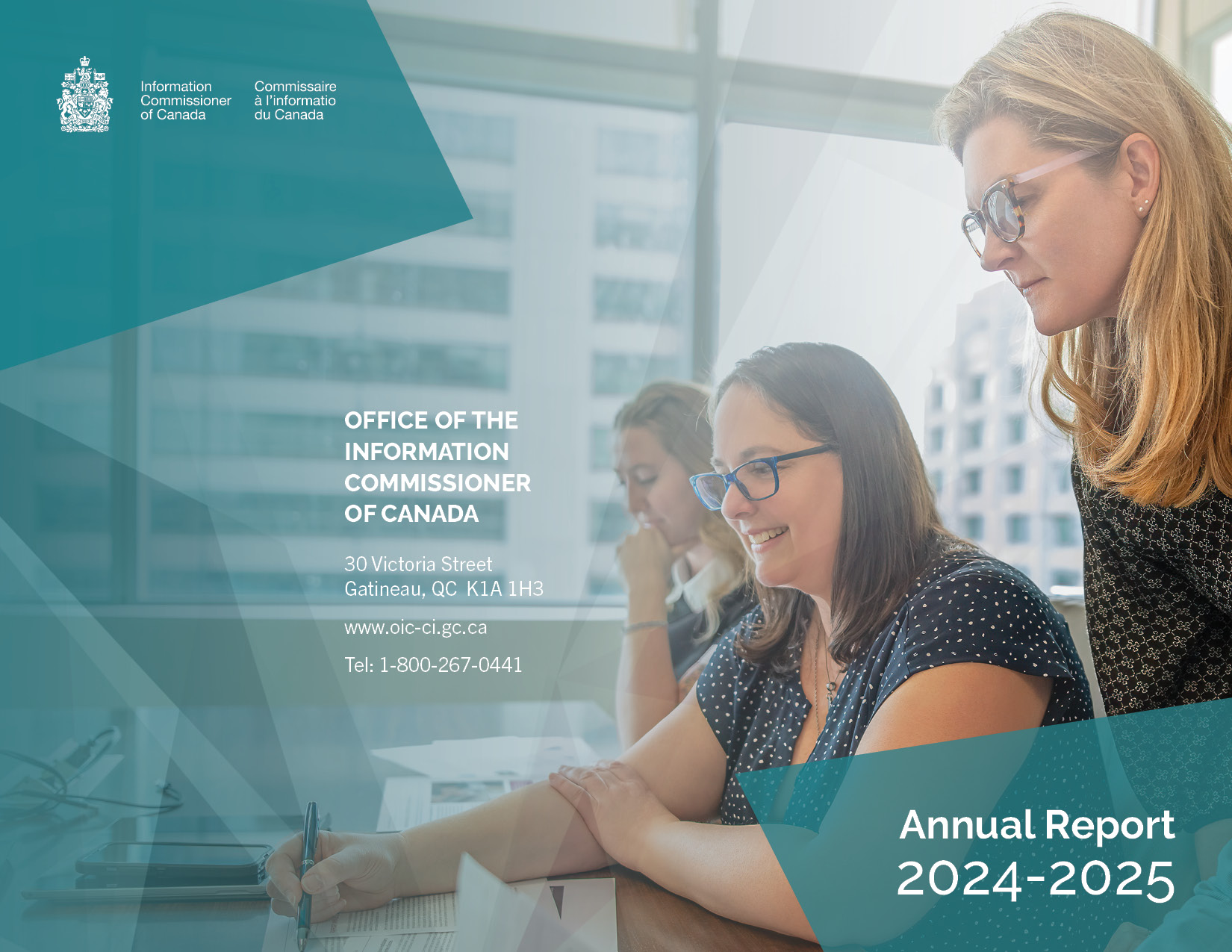2024-2025 Annual Report

Table of contents
- Message from the Commissioner
- 2024–2025: Year in review
- Steady progress on specific priorities yields tangible results: the story of the Commissioner’s first term
- A year of success and continued progress
- Revisiting areas of concern
- About the Office of the Information Commissioner
- Annex – Annual Report of the Ad Hoc Information Commissioner
Message from the Commissioner
This report highlights the work carried out by the Office of the Information Commissioner (OIC) to uphold the right of access to information during the 2024–2025 fiscal year. Through investigations, providing guidance to complainants and institutions, and offering advice to Parliament, my team and I continued to deliver tangible results for Canadians.
Under different circumstances, this report would have been written as a bookend to my seven-year term. However, when I received official confirmation late last year that I was being renewed as Information Commissioner of Canada, my team and I were only in the earliest stages of drafting the report. As a result, it reflects the ongoing nature, and not the conclusion, of the work I undertook when I was appointed Information Commissioner in 2018. I am proud of my team’s achievements, but that does not blind me to that fact that much remains to be done.
From the beginning, my greatest priority has been ensuring compliance with the Access to Information Act. When necessary, I have not hesitated to make orders and take legal action to enforce compliance with the law. My efforts have also focused on fostering a dynamic and effective OIC.
In my engagement with government institutions, I have emphasized the importance of leadership, sound record-keeping and robust information management—especially during the extraordinary period of the pandemic. I have also advocated for a funding mechanism for my office that would respect my independence as an Agent of Parliament.
As I begin my second mandate, I remain deeply committed to safeguarding Canadians’ right of access to information. Building on the progress achieved since 2018, my renewed vision for the OIC is to establish the organization as a model of excellence. This involves continuously improving our processes—including those related to information management—and investing in modern tools. In my second term, I will also maintain my focus on results, even as I continue to push for the changes to the Act that are required to forge the access system that best serves Canada.
This is why I will continue advocating for legislative reform, promoting the benefits of a change in culture within institutions, and taking decisive action to reduce delays in responding to access to information requests. I also look forward to playing an active role in a full and comprehensive overhaul of the Act, set to begin in June 2025. The past seven years have provided me with a wealth of experience and insights that will benefit this work.
I am grateful for the opportunity to continue in the role of Information Commissioner and am proud to carry on this important work on behalf of Canadians. Now more than ever, I believe that government institutions have a fundamental responsibility to build public confidence and to counter disinformation through transparency. Communicating openly and in a timely fashion about matters that affect Canadians is key to maintaining credibility and reinforcing trust. Strengthening transparency and accountability is not only good governance, it is vital to upholding the integrity of democracy.

Caroline Maynard
Information Commissioner of Canada


I am supported in my work by a strong and dedicated team. The OIC has emerged as an employer of choice, with high retention rates and strong employee engagement. Through efficient resource management—including space optimization, modernized information management tools and the reallocation of funds to strengthen investigative capacity—we have enhanced our ability to deliver on my mandate effectively.
I am extremely proud of what my office has accomplished. My team and I have made the most of our capacity to deliver meaningful results. With resources commensurate with the workload, I am confident we could build on these successes and further strengthen compliance with the Access to Information Act.
The system that supports the administration of the Act remains stuck in the era of filing cabinets and typewriters in which it was born. It is 2025, and the information landscape has evolved dramatically since the 1980s. Transforming the information management system—and the processes used to gather and share information—to provide timely access for Canadians is within reach.
2024–2025: Year in review
SPRING
Commissioner raises financial and compliance concerns before parliamentary committee
Commissioner Maynard appears twice before the House of Commons Standing Committee on Access to Information, Privacy and Ethics to discuss the OIC’s Main Estimates and financial challenges. She highlights growing institutional non-compliance with her orders, and explains that the OIC has a structure deficit and that this shortfall will affect operations. She later addresses these issues in a letter to the Acting Secretary of the Treasury Board.
Revisiting immigration-related access to information challenges
The Commissioner tables a special report exploring the root causes of the growing number of access to information requests directed to the Canada Border Services Agency (CBSA). The report underscores a persistent issue identified in the Commissioner’s 2021 systemic investigation against Immigration, Refugees and Citizenship Canada: that it fails to provide clients with direct access to their personal information, relying instead on the access system. As a result, requesters increasingly turn to CBSA—which has access to the same data through shared systems—placing undue strain on this institution and the broader federal access regime.
Beyond strategies and plans: calling for legislative change
In her letter to the President of the Treasury Board presenting her 2023-2024 Annual Report, the Commissioner comments on the Government of Canada Trust and Transparency Strategy and Access to Information Modernization Action Plan. In her view, the measures announced by the Government will not be sufficient to resolve longstanding issues that imperil the right of access.
Access to information in the digital age: a global call for transparency
The Commissioner is a signatory to the joint statement released during the 15th International Conference of Information Commissioners. The statement affirms the importance of transparency and accountability. Alongside information commissioners from around the world, she calls on governments to leverage digital technologies to make information more accessible, streamline administrative processes and foster greater citizen engagement.
SUMMER
Supporting truth and reconciliation through access to information
Following the Commissioner’s appearance at the Standing Senate Committee on Indigenous Peoples in February 2024, the Committee releases a report containing 11 recommendations to improve access to residential school records. Four of these recommendations focus on access to information, including ensuring the Act reflects rights set out in the United Nations Declaration on the Rights of Indigenous Peoples, and providing broader discretionary powers to institutions to disclose records when the public interest warrants.
Championing transparency during Right to Know Week
During Right to Know Week, the Commissioner issues a statement reaffirming the fundamental role of the right of access in democratic societies, and underscoring the importance of building transparency into government policies, programs and processes from the outset. To mark the occasion, she also delivers a presentation to the federal access to information and privacy community, which draws more than 450 attendees.
Appearance at the Standing Senate Committee on National Finance
The Commissioner appears before the Standing Senate Committee on National Finance to discuss the OIC’s Main Estimates, taking the opportunity to underscore the need for a funding model that reflects her independence as an Agent of Parliament.
FALL
Commissioners from across Canada connect
At the 2024 Annual Meeting of Federal, Provincial and Territorial Information and Privacy Commissioners and Ombuds in Toronto, the Commissioner joins her counterparts in reaffirming a collective commitment to protecting access rights. Together, they adopt a joint resolution urging their respective governments to take transparency into account early in the design of systems, administrative processes, and governance models, and to embed it in their day-to-day operations.
Commissioner confirmed for second term
Following the Commissioner’s appearance before the House of Commons Standing Committee on Access to Information, Privacy and Ethics and the confirmation of her appointment in both the House of Commons and the Senate, the Prime Minister announces Commissioner Maynard’s reappointment as Information Commissioner of Canada for another seven-year term.
Engaging with legal professionals on access issues
The Commissioner and senior leaders from the OIC attend the Canadian Bar Association’s Privacy and Access Law Conference. She moderates a panel discussing the balance between the protection of solicitor-client privilege in the public sector and Canadians’ right to access historical legal information held by government. The Commissioner also takes part in the Regulators’ Perspective panel on current issues in the access field.
Commissioner chairs Federal, Provincial and Territorial Investigators Conference to foster collaboration
The Commissioner chairs the 2024 Federal, Provincial and Territorial Investigators Conference, an initiative launched in 2021 to foster collaboration among investigators working for Canada’s information and privacy regulators. The conference provides an opportunity to share knowledge and investigation best practices.
Lessons learned and future goals
In a speech to access and privacy professionals, the Commissioner reflects on key lessons learned during her first term, and provides a retrospective on her activities over the past year. Looking to the future, she outlines areas of focus for her recently confirmed second term.

WINTER
Transparency starts at the top
Throughout the winter, the Commissioner engages with senior leaders and executive committees across government, including at the Department of National Defence, Global Affairs Canada, the Department of Finance Canada, and Public Services and Procurement Canada. In these meetings, and other similar meetings she held earlier in the year, she stresses the critical role of leadership in making transparency an operational priority and a core institutional value.
Amplifying the message: OIC management promotes transparency and innovation
OIC directors of investigations promote government transparency to various audiences, echoing the Commissioner’s message. Whether speaking to students in an Information Privacy Law class at Queen’s University or participating in key events over the course of the year such as the Digital Government Leaders Summit and National Research Claims Directors’ conference, OIC officials highlight, among other topics, the importance of strong information management for leveraging artificial intelligence within the access system.
Commissioner’s second term: promoting a culture of transparency and advancing efficiency
The Commissioner begins her second term on March 1, 2025. She identifies her major goals, which include pushing for changes to the Act, advocating for a more efficient and responsive access to information system, and promoting a culture of transparency within institutions.

Steady progress on specific priorities yields tangible results: the story of the Commissioner’s first term
Commissioner Maynard’s first seven-year term focused on four key priorities: reducing the inventory of complaints, preparing for and implementing changes to the Access to Information Act, enhancing transparency in the day-to-day operations of the OIC, and strengthening collaboration with various stakeholders. Achieving tangible results in each area has laid a strong foundation for continued progress. With her first term having concluded in 2024–2025, this annual report provides a timely opportunity to look back at these accomplishments.
By the end of 2024–2025, the Commissioner had dealt with a record number of new complaints and essentially eliminated the inventory she had inherited when she began her first term.
Reducing the inventory amid influx of new complaints
When she was appointed on March 1, 2018, the Commissioner’s first priority was to address the inventory of complaints she had inherited, while continuing to investigate new complaints. There were more than 3,500 open complaints when she started, some of which had been in the inventory for more than 10 years.
The OIC concentrated on concluding more complaints each year by streamlining processes and introducing innovative practices. These improvements steadily increased the number of investigations completed year over year. By the end of her first term, the inventory had shrunk to fewer than 2,200 complaints.
In 2020, the OIC introduced a strategic plan centered on innovation and transformation to guide its efforts to achieve its mission. To build on this progress, the Commissioner launched a multi-phase evaluation of the Investigations program in 2021. This began with a review of the OIC Registry (the group that receives new complaints and reviews their admissibility), followed by a 2022 evaluation of the Investigations program from the perspectives of institutions and senior officers. The final phase—a consultation with complainants—was completed last year, closing the loop on a comprehensive evaluation process.
The response to this consultation, published in the fall of 2024, reaffirmed the Commissioner’s strong focus on continuous improvement—an approach she has championed since Day 1. Although the OIC does not control the number of complaints it receives, or their complexity, the entire organization remains committed to refining its operations and ensuring the right of access for Canadians is upheld.
Ensuring complainants receive the information to which they are entitled
Between 2018 and 2025, the OIC reduced its inventory by 38% and concluded 4% more complaints than it accepted during this period.
The volume of complaints fluctuates from year to year. Significant spikes in delay complaints during 2021–2022 and 2022–2023 were driven by prospective immigrants’ representatives reporting a lack of response to access requests for immigration files. Since then, improvements in access request processing by Immigration, Refugees and Citizenship Canada, among other factors, have led to a substantial decline in this type of complaint.
The Commissioner also initiated six systemic investigations—two of which focused on access to immigration-related information—to address broader issues. She dedicated resources to these efforts, believing they pay dividends by getting at the root causes of chronic issues that plague the federal access system. Recommendations stemming from these investigations are detailed in special reports tabled to Parliament. One systemic investigation into records related to the ArriveCAN application will be completed during 2025–2026.
Inventory of open complaints – March 1, 2018, to March 31, 2025, and total complaints accepted in interim
Text version
Inventory of open complaints – March 1, 2018, to March 31, 2025, and total complaints accepted in interim
| Inventory, March 1, 2018 | Complaints accepted by fiscal year | Total complaints accepted, 2018–2019 to 2024–2025 | Inventory, March 31, 2025 | |
|---|---|---|---|---|
| 2018-2019 | 2,191 | 2,467 | 34,047 | 3,579 |
| 2019-2020 | 6,173 | |||
| 2020-2021 | 4,068 | |||
| 2021-2022 | 6,945 | |||
| 2022-2023 | 7,407 | |||
| 2023-2024 | 3,361 | |||
| 2024-2025 | 3,626 |
Complaints accepted vs Complaints concluded through investigations
2018–2019 to 2024–2025
Text version
Complaints accepted vs Complaints concluded through investigations – 2018–2019 to 2024–2025
| 2018–2019 | 2019–2020 | 2020–2021 | 2021–2022 | 2022–2023 | 2023–2024 | 2024–2025 | |
|---|---|---|---|---|---|---|---|
| Complaints accepted | 2,467 | 6,173 | 4,068 | 6,945 | 7,407 | 3,361 | 3,626 |
| Complaints concluded through investigations | 2,608 | 5,528 | 4,060 | 6,787 | 8,089 | 4,183 | 4,108 |
Complaints accepted, by type
2018–2019 to 2024–2025
Text version
Complaints accepted, by type - 2018–2019 to 2024–2025
| 2018–2019 | 2019–2020 | 2020–2021 | 2021–2022 | 2022–2023 | 2023–2024 | 2024–2025 | |
|---|---|---|---|---|---|---|---|
| Delay complaints | 1,244 | 2,419 | 1,110 | 4,735 | 5,670 | 1,665 | 1,839 |
| Extension of time complaints | 209 | 2,715 | 2,130 | 1,035 | 747 | 543 | 525 |
| Refusal complaints | 1,014 | 1,039 | 828 | 1,175 | 990 | 1,153 | 1,262 |
The OIC investigates complaints from requesters who believe institutions did not respect their rights under Part 1 of the Access to Information Act.
Delay complaints focus on institutions’ lack of response to access requests within the deadlines set out in the Act.
Extension of time complaints focus on whether the extra time an institution decided to take to respond to a request is reasonable or was taken for legitimate reasons, or whether the institution followed the rules in the Act for claiming extensions.
Refusal complaints concern institutions’ application of exemptions and exclusions under the Act, the adequacy of their record searches, the application of fees, the provision of records in a particular official language, the provision of records in alternative formats, publications under section 5 of the Act, and other matters relating to requesting or obtaining access to records.
Preparing for and implementing changes to the Access to Information Act
The Commissioner’s second priority was to prepare for the implementation of Bill C-58, which amended the Access to Information Act in June 2019.
Prior to 2019, the Information Commissioner’s authority was limited to issuing recommendations when a complaint was determined to be well founded. Bill C-58 gave the Information Commissioner the power to issue binding orders to institutions when complaints are well founded.
Most complaints concluded by the OIC do not require the Commissioner to issue orders. However, the proportion of complaints with orders is increasing—from 0.05% of all complaints concluded in 2020–2021 to over 9% in 2024–2025.
Another new provision of the Act introduced in Bill C-58 allows institutions to seek the Information Commissioner’s approval to decline to act on an access request if, in the opinion of the head of the institution, the request is vexatious, made in bad faith or otherwise an abuse of the right to make a request for access to records. To date, the Commissioner has received 76 such applications. Of these, she has granted 13. Summaries of the Commissioner’s decisions are available on the OIC’s website.
When orders are ignored: addressing institutional non-compliance
In 2022–2023, the Commissioner began expressing concerns about institutions that were neither implementing her orders nor seeking a review before the Federal Court, as the Act requires. By ignoring her orders, these institutions were breaking the law. In the face of this intransigence, the Commissioner has since launched legal proceedings against such institutions. In 2023–2024, she began initiating applications for a writ of mandamus before the Court to compel compliance with her orders. A writ of mandamus is a remedy asking a court to order a public authority to perform a legal duty.
In March 2025, the Commissioner raised this issue in a letter to the President of Treasury Board, emphasizing that relying on costly and time-consuming legal proceedings wastes resources and undermines the intent of the Act. She urged the President to issue clear guidance to institutions, reminding them of their legal obligation to either comply with her orders or seek judicial review.
The Commissioner intends to put the spotlight on this issue once again during the next legislative review, scheduled to begin in 2025.
Complaints concluded through investigations for which orders were issued
2020–2021 to 2024–2025
Text version
Complaints concluded through investigations for which order were issued – 2020–2021 to 2024–2025
| Percentage (number) of orders issued | Number of complaints concluded through investigations | |
|---|---|---|
| 2020–2021 | 2 | 4,060 |
| 2021–2022 | 27 | 6,787 |
| 2022–2023 | 157 | 8,089 |
| 2023–2024 | 310 | 4,183 |
| 2024–2025 | 375 | 4,108 |

Ensuring that the OIC’s day-to-day work is open and transparent
The Commissioner’s third priority was to provide clear guidance on her interpretation of the Act and the approach of her office when conducting investigations, to help all parties to a complaint understand the OIC’s position. To this end, the OIC regularly published guidance on the OIC website and updated the Frequently Asked Questions.
Since the 2019 amendments to the Act, the Commissioner may publish final reports detailing the results of her investigations. The OIC publishes many of these final reports in its Decisions Database, along with all the Commissioner’s orders. These final reports are also available on CanLII, which provides access to decisions from all Canadian courts as well as numerous tribunals.
Collaborating with parliamentarians, complainants, institutions and other stakeholders
The Commissioner’s fourth and final priority was to collaborate with parliamentarians, complainants and other stakeholders to address barriers in the system, and with government institutions to help them meet their obligations under the Act. Throughout her first term, she took part in more than 150 meetings and delivered presentations to parliamentarians, senior officials, ministers and public servants of various institutions, including annual meetings with members of the access to information and privacy community.
In January 2021, the Commissioner submitted a number of recommendations for changes to the system and further amendments to the Act as part of the Government’s review of access to information. Since then, she has reiterated her calls to modernize the Act. In addition, she appeared more than 20 times in front of seven parliamentary committees, providing information on her operations and advice to parliamentarians in the context of various studies, including one by the House of Commons Standing Committee on Access to Information, Privacy and Ethics on the state of Canada’s access to information system.
The Commissioner has been playing a leading role within the Canadian community of information commissioners and ombuds, notably as chair of the annual conference of federal, provincial and territorial investigators, which she was instrumental in establishing in 2021. On the international stage, she has been an active member of the International Conference of Information Commissioners.

A year of success and continued progress
Improving complaint resolution and reducing the inventory
During 2024–2025, the OIC concluded 5,406 complaints. Complainants can expect one of several outcomes upon submitting a complaint. While 13% of complaints concluded in 2024–2025 were determined to be well founded and 9% not well founded, 39% were either discontinued by the complainant or concluded by the OIC Registry because they were received outside legislative time limits or otherwise inadmissible.
The investigations into the remaining 2,123 complaints were ceased, most often because, as a result of the OIC’s inquiries and work, the complainant received a response to their access request, making further investigation unnecessary.
The OIC also continued to make substantial progress in resolving the most complex complaints in the inventory this year. As of March 31, 2025, the inventory contained 2,191 complaints, which is nearly 40% fewer than on Day 1 of the Commissioner’s first term.
The OIC began 2025–2026 with an inventory largely composed of complaints that were either under active investigation or were recently received and awaiting assignment to an investigator.
Complaints concluded - 2024-2025
Total: 5,406
Text version
Complaints concluded – 2024–2025
| Complaint outcomes | 2024–2025 |
|---|---|
| Well founded | 694 |
| Not well founded | 485 |
| Discontinued | 806 |
| Cease to investigate | 2,123 |
| Concluded by Registry | 1,298 |
Total: 5,406
Inventory of open complaints, by age and year submitted
Text version
Inventory of open complaints, by age and year submitted
| March 31, 2019 | March 31, 2020 | March 31, 2021 | March 31, 2022 | March 31, 2023 | March 31, 2024 | March 31, 2025 | |
|---|---|---|---|---|---|---|---|
| Pre 2018 | 1,969 | 1,167 | 869 | 419 | 106 | 24 | 4 |
| 2018–2019 | 1,371 | 659 | 459 | 286 | 88 | 18 | 1 |
| 2019–2020 | 2,128 | 746 | 398 | 184 | 58 | 17 | |
| 2020–2021 | 31 | 1,931 | 561 | 226 | 75 | 22 | |
| 2021–2022 | 2,476 | 603 | 179 | 46 | |||
| 2022–2023 | 2,265 | 458 | 132 | ||||
| 2023–2024 | 1,837 | 343 | |||||
| 2024–2025 | 1,626 | ||||||
| Total | 3,340 | 3,985 | 4,005 | 4,140 | 3,472 | 2,649 | 2,191 |
Complaint Activity in 2024–2025
Complaints in inventory, April 1, 2024
Complaints submitted in 2024–2025
Complaints concluded in 2024-2025
Complaints in inventory, March 31, 2025
Outcomes
Well founded
Not well founded
Discontinued
Cease to investigate
| Complaints as of April 1, 2023 | Complaints registered in 2023-2024 | Investigations completed in 2023-2024 | Well founded | Not well founded | Discontinued | Cease to investigate | Refuse to investigate | Orders | Total | |
|---|---|---|---|---|---|---|---|---|---|---|
| Immigration, Refugees and Citizenship Canada | 170 | 925 | 879 | n/a | 15 | 16 | 320 | 528 | 216 | |
| Canada Border Services Agency | 534 | 161 | 522 | n/a | 30 | 23 | 51 | 418 | 173 | |
| Department of National Defence | 95 | 381 | 332 | n/a | 100 | 36 | 12 | 184 | 144 | |
| Privy Council Office | 255 | 219 | 255 | n/a | 94 | 54 | 23 | 84 | 219 | |
| Global Affairs Canada | 231 | 217 | 333 | n/a | 36 | 11 | 218 | 68 | 115 | |
| Royal Canadian Mounted Police | 203 | 153 | 205 | n/a | 16 | 69 | 23 | 97 | 151 | |
| Transport Canada | 57 | 274 | 109 | n/a | 29 | 12 | 9 | 59 | 222 | |
| Library and Archives Canada | 143 | 178 | 189 | n/a | 65 | 18 | 20 | 86 | 132 | |
| Canada Revenue Agency | 136 | 93 | 123 | n/a | 32 | 21 | 21 | 49 | 106 | |
| Health Canada | 56 | 147 | 144 | n/a | 34 | 11 | 4 | 95 | 59 | |
| Public Services and Procurement Canada | 111 | 48 | 131 | n/a | 18 | 41 | 16 | 56 | 28 | |
| Indigenous Services Canada | 49 | 39 | 43 | n/a | 8 | 11 | 3 | 21 | 45 | |
| Employment and Social Development Canada | 49 | 35 | 47 | n/a | 19 | 5 | 1 | 22 | 37 | |
| Department of Justice Canada | 41 | 39 | 57 | n/a | 17 | 17 | 5 | 18 | 23 | |
| Canadian Heritage | 32 | 45 | 49 | n/a | 15 | 14 | 1 | 19 | 28 | |
| Department of Finance Canada | 23 | 53 | 35 | n/a | 1 | 5 | 5 | 24 | 41 | |
| Canadian Security Intelligence Service | 35 | 36 | 46 | n/a | 10 | 10 | 4 | 22 | 25 | |
| Public Safety Canada | 29 | 41 | 37 | n/a | 3 | 8 | 2 | 24 | 33 | |
| Environment and Climate Change Canada | 18 | 48 | 50 | n/a | 16 | 5 | 1 | 28 | 16 | |
| Correctional Service Canada | 28 | 37 | 42 | n/a | 9 | 3 | 2 | 28 | 23 | |
| Innovation, Science and Economic Development Canada | 30 | 25 | 35 | n/a | 11 | 8 | 2 | 14 | 20 | |
| Treasury Board of Canada Secretariat | 16 | 30 | 24 | n/a | 5 | 5 | 2 | 12 | 22 | |
| Natural Resources Canada | 16 | 28 | 34 | n/a | 12 | 8 | 4 | 10 | 10 | |
| Fisheries and Oceans Canada | 14 | 28 | 24 | n/a | 6 | 6 | 5 | 7 | 18 | |
| Public Health Agency of Canada | 18 | 20 | 21 | n/a | 11 | 3 | 1 | 6 | 17 | |
| Other institutions (71) | 284 | 326 | 342 | n/a | 82 | 65 | 51 | 144 | 268 | |
| Total | 2,673 | 4,924 | 5,406 | 1,298 | 694 | 485 | 806 | 2,123 | 2,191 |
Text version
Complaint Activity in 2024–2025
| Complaints carried over and received in 2024–2025 | Complaints concluded in 2024–2025 | Complaints in inventory, March 31, 2025 | ||||||||
|---|---|---|---|---|---|---|---|---|---|---|
| Complaints in inventory, April 1, 2024 | Complaints submitted in 2024–2025 | Total | Concluded by Registry* | Well founded | Not well founded | Discontinued | Cease to investigate | Total | ||
| Immigration, Refugees and Citizenship Canada | 170 | 925 | 1,095 | 0 | 15 | 16 | 320 | 528 | 879 | 216 |
| Canada Border Services Agency | 534 | 161 | 695 | 0 | 30 | 23 | 51 | 418 | 522 | 173 |
| Department of National Defence | 95 | 381 | 476 | 0 | 100 | 36 | 12 | 184 | 332 | 144 |
| Privy Council Office | 255 | 219 | 474 | 0 | 94 | 54 | 23 | 84 | 255 | 219 |
| Global Affairs Canada | 231 | 217 | 448 | 0 | 36 | 11 | 218 | 68 | 333 | 115 |
| Royal Canadian Mounted Police | 203 | 153 | 356 | 0 | 16 | 69 | 23 | 97 | 205 | 151 |
| Transport Canada | 57 | 274 | 331 | 0 | 29 | 12 | 9 | 59 | 109 | 222 |
| Library and Archives Canada | 143 | 178 | 321 | 0 | 65 | 18 | 20 | 86 | 189 | 132 |
| Canada Revenue Agency | 136 | 93 | 229 | 0 | 32 | 21 | 21 | 49 | 123 | 106 |
| Health Canada | 56 | 147 | 203 | 0 | 34 | 11 | 4 | 95 | 144 | 59 |
| Public Services and Procurement Canada | 111 | 48 | 159 | 0 | 18 | 41 | 16 | 56 | 131 | 28 |
| Indigenous Services Canada | 49 | 39 | 88 | 0 | 8 | 11 | 3 | 21 | 43 | 45 |
| Employment and Social Development Canada | 49 | 35 | 84 | 0 | 19 | 5 | 1 | 22 | 47 | 37 |
| Department of Justice Canada | 41 | 39 | 80 | 0 | 17 | 17 | 5 | 18 | 57 | 23 |
| Canadian Heritage | 32 | 45 | 77 | 0 | 15 | 14 | 1 | 19 | 49 | 28 |
| Department of Finance Canada | 23 | 53 | 76 | 0 | 1 | 5 | 5 | 24 | 35 | 41 |
| Canadian Security Intelligence Service | 35 | 36 | 71 | 0 | 10 | 10 | 4 | 22 | 46 | 25 |
| Public Safety Canada | 29 | 41 | 70 | 0 | 3 | 8 | 2 | 24 | 37 | 33 |
| Environment and Climate Change Canada | 18 | 48 | 66 | 0 | 16 | 5 | 1 | 28 | 50 | 16 |
| Correctional Service Canada | 28 | 37 | 65 | 0 | 9 | 3 | 2 | 28 | 42 | 23 |
| Innovation, Science and Economic Development Canada | 30 | 25 | 55 | 0 | 11 | 8 | 2 | 14 | 35 | 20 |
| Treasury Board of Canada Secretariat | 16 | 30 | 46 | 0 | 5 | 5 | 2 | 12 | 24 | 22 |
| Natural Resources Canada | 16 | 28 | 44 | 0 | 12 | 8 | 4 | 10 | 34 | 10 |
| Fisheries and Oceans Canada | 14 | 28 | 42 | 0 | 6 | 6 | 5 | 7 | 24 | 18 |
| Public Health Agency of Canada | 18 | 20 | 38 | 0 | 11 | 3 | 1 | 6 | 21 | 17 |
| Subtotal | 2,389 | 3,300 | 5,689 | 0 | 612 | 420 | 755 | 1,979 | 3,766 | 1,923 |
| Other institutions (71) | 284 | 326 | 610 | 0 | 82 | 65 | 51 | 144 | 342 | 268 |
| Not accepted for investigation | 0 | 1,298 | 1,298 | 1,298 | 0 | 0 | 0 | 0 | 1,298 | 0 |
| Total | 2,673 | 4,924 | 7,597 | 1,298 | 694 | 485 | 806 | 2,123 | 5,406 | 2,191 |
Why are some complaints not investigated?
Complaints must meet a series of requirements to ensure the Commissioner has the power to investigate them. The OIC Registry is responsible for reviewing complaints to determine whether they are admissible.
This year, the Registry concluded 1,298 complaints. These included complaints submitted after the 60-day deadline, as well as complaints against institutions not subject to the Access to Information Act. When a complaint is determined to be inadmissible, the complainant receives a written decision from the OIC Registry outlining the reasons.
Federal Court examines OIC Registry decision
A complainant had submitted a complaint against the Canada Revenue Agency concerning redactions made on documents and alleging that some documents were missing. The Registry did not accept the complaint, determining that the allegation about the redactions was outside the Commissioner’s jurisdiction because the documents had not been disclosed in response to an access request. The Registry also concluded that the allegation about missing documents had been submitted after the 60-day time limit. The complainant sought a judicial review of the Commissioner’s decision.
In Chabursky v. Canada (Attorney General), the Federal Court concluded that the Commissioner’s decision was reasonable. It found that the documents had been provided to the complainant outside the context of an access request, confirming that the Commissioner had no jurisdiction to investigate the complaint. The Court also found it reasonable for the Commissioner to conclude that the allegation about missing records was submitted outside the 60-day limit set out in section 31 of the Act. Finally, it rejected the complainant’s argument that the Commissioner’s decision violated subsection 4(2.1), which outlines the duty to make every reasonable effort to assist requesters, affirming that this duty rests with the head of the government institution, not the OIC.
This year, the OIC received a total of 4,924 complaints. After review, however, 3,626 were accepted and 1,298 were concluded by Registry.
Complaints concluded by Registry - 2024-2025
Total: 1,298
Text version
Complaints concluded by Registry – 2024–2025
| Inadmissible | Not accepted | Other | ||
|---|---|---|---|---|
| Outside Mandate | 567 | |||
| Out of time | 360 | |||
| Insufficient Information | 251 | |||
| Duplicate | 26 | |||
| Power to investigate exhausted | 9 | |||
| Premature | 11 | |||
| Withdrawn | 71 | |||
| Refuse to investigate | 3 | |||
Total: 1,298
Why does the OIC refuse or cease to investigate some complaints?
Generally, the Commissioner must investigate all admissible complaints. However, she has the authority under subsection 30(4) of the Act to refuse or cease to investigate complaints, even when they are within her power
to investigate.
There are certain circumstances under which the Commissioner will exercise this authority. For example, when an institution responds to an access request before an investigation into a delay complaint has begun or is complete, or when previously withheld information is disclosed before an investigation into a complaint about the application
of exemptions is finished.
While some complainants may still hope to receive a confirmation that their complaint was well founded once their specific issue is resolved, the Commissioner does not have the authority to impose sanctions on the institution. Proceeding with the investigation of matters that have already been resolved would serve no practical purpose and would not provide any further relief to the complainant.
Trivial, frivolous or vexatious complaints, or those made in bad faith
The Commissioner may also decide to refuse or cease to investigate complaints that are, in her view, trivial, frivolous or vexatious, or made in bad faith:
- A trivial complaint is generally a complaint that is trite or of little or no importance.
- A frivolous complaint also often concerns trivial matters. These complaints could also be senseless, foolish or fanciful.
- A vexatious complaint is generally a complaint made for an improper purpose, consciously or not. Such complaints may include
those primarily directed towards harassing or oppressing others, including institutions and individuals. - A complaint made in bad faith involves conscious wrongdoing and/or an improper or dishonest motive. It is more than simply bad judgment or negligence. Such complaints include those intended to mislead and/or deceive.
The OIC’s website provides additional guidance and summaries on the Commissioner’s decisions to refuse or cease to investigate complaints.
Discontinued complaints
Complainants may choose to withdraw their complaint when they no longer require the OIC to investigate their allegations. For example, they may no longer need the information they requested, or the circumstances that prompted their complaint may have changed. Complaints may also be discontinued when complainants have received sufficient information from the institution during the investigation or are satisfied with the explanations provided in support of the response received. In some cases, the investigation is nearly complete when complainants decide to withdraw their complaint.
Once a complaint is discontinued, the Commissioner no longer has the authority to pursue the investigation. However, she may initiate her own complaint if she is satisfied that there are reasonable grounds to investigate the matter, including when she determines that an investigation is necessary to promote the right of access.
The Commissioner’s ability to refuse or cease investigating complaints gives her the flexibility to allocate her resources more effectively, focusing her efforts on complaints in which requesters have yet to receive the information they are seeking.
This, in turn, allows for a more effective allocation of resources across the access to information system, since the units responsible for handling complaints within institutions subject to the Act are also responsible for processing access requests. Ceasing to investigate such complaints enables institutions to free up resources to process requests more rapidly or address other active complaints.
Expanded guidance for complainants and institutions
In 2024–2025, the Commissioner continued to update and add to the guidance on her website for complainants, institutions and other stakeholders.
A new page updated each quarter provides statistics on the Commissioner’s caseload—including how it changes over the year and between years—and the outcomes of all new complaints submitted. A new guide focuses on the Commissioner’s interpretation of, and case law associated with, the exemption under section 16 of the Act. This provision allows institutions to withhold information related to law enforcement, investigations and the security of penal institutions. A second new guide focuses on institutions’ exercise of discretion under the Act. The guide looks at who within an institution may exercise discretion related to disclosing information in response to access requests, and how. The guide also examines the elements considered by the Commissioner to determine whether an institution’s exercise of discretion was reasonable.
In addition, the guidance on the applications institutions may submit to the Commissioner when seeking her approval to decline to act on an access request was also revised. These updates provide additional key information for both institutions and requesters. The web page now includes explanations and examples of the various reasons institutions may decide to make such applications, including that requests are, in the opinion of the head of the institution, trivial or vexatious.

Strengthening accountability: the Commissioner’s orders in 2024–2025
The Commissioner has the authority to issue orders when complaints are well founded. Orders require institutions to fulfill their obligations under the Act. All orders help chart the path forward for transparency and timely access.
In 2024–2025, the Commissioner issued 375 orders, the majority of which related to delay complaints. The Commissioner’s orders are legally binding, meaning that institutions must implement them unless they apply to the Federal Court for a review. In 2024–2025, four institutions went to court for such a review. Of the 31 cases, 29 concerned delay complaints, one related to an extension of time complaint for which the Commissioner ordered the institution to respond to the access request, and one involved a refusal complaint for which she ordered the institution to disclose records.
In the case involving an order issued after an investigation into a refusal complaint, the complainant alleged that Indigenous Services Canada (ISC) had improperly withheld information under paragraph 20(1)(c) (financial impact on a third party), paragraph 20(1)(d) (negotiations by a third party) and section 23 (solicitor-client and litigation privilege) of the Act. This was in response to an access request for the settlement agreement between the Crown and the Squamish Nation relating to Kitsilano Point and area, as well as all related maps and appendices.
Neither ISC nor the third party showed that the information met the requirements of the exemptions. Specifically, these parties did not establish a clear and direct connection between the disclosure of any specific information and a risk of harm, show that the information could result in a reasonable expectation of interference with negotiations, or prove that solicitor-client and litigation privilege applied.
As a result, the Commissioner ordered ISC to disclose the records in their entirety. ISC gave notice to the Commissioner that it would not disclose the records and applied for a review before the Federal Court. The case is ongoing.
Orders issued - Top 10 institutions, 2024-2025
Text version
Orders issued - Top 10 institutions, 2024-2025
| Institution | Orders issued |
|---|---|
| Department of National Defence | 64 |
| Library and Archives Canada | 48 |
| Privy Council Office | 42 |
| Health Canada | 18 |
| Global Affairs Canada | 17 |
| Communications Security Establishment Canada | 14 |
| Canadian Heritage | 14 |
| Transport Canada | 14 |
| Public Services and Procurement Canada | 13 |
| Canada Revenue Agency | 12 |
Orders issued, by complaint type
2024–2025 (Percentages)
Text version
Orders issued, by complaint type – 2024–2025
| Complaint type | Orders issued | Percentage |
|---|---|---|
| Delay complaints | 242 | 65% |
| Extension of time complaints | 87 | 23% |
| Refusal complaints | 46 | 12% |
| Total | 375 | 100% |
Federal Court reviews of Commissioner’s orders – 2024-2025
| Institution | Delay complaint cases | Extension of time complaint cases | Refusal complaint cases |
|---|---|---|---|
| Department of National Defence | 20 | ||
| Library and Archives Canada | 6 | 1 | |
| Communications Security Establishment Canada | 3 | ||
| Indigenous Services Canada | 1 |

Federal Court of Appeal and Federal Court rulings on access to information
Two decisions were also rendered this year regarding orders on refusal complaints.
1 - Federal Court of Appeal rules on Export Development Canada’s challenge to information disclosure
The case raised the issue of whether the redacted information was exempt from the right of access under subsection 24(1) of the Access to Information Act (which incorporates the prohibition on disclosure contained in section 24.3 of the Export Development Act, as listed in Schedule II of the Access to Information Act) and/or section 18.1 of the Access to Information Act. The Commissioner had ordered Export Development Canada (EDC) to disclose a policy type and number, as well as maximum liability amounts, which had been withheld under subsections 18.1(1) and 24(1).
EDC sought review of the Commissioner’s order before the Federal Court. The Federal Court rejected EDC’s application and ordered the institution to release the information at issue. EDC appealed the decision. The Federal Court of Appeal allowed the appeal, ruling that the disclosure of the disputed information is exempted under subsection 24(1).
The Court of Appeal concluded that the words “obtained by” in section 24.3 of the Export Development Act must be interpreted broadly to mean not only information received from a third party (including its customers) but also information created through EDC’s own efforts. Although the Court of Appeal did not determine whether the information could also be withheld under section 18.1 of the Access to Information Act, it did state that the Federal Court had erred in its interpretation of this provision.
2 - Federal Court upholds OIC’s decision on Public Services and Procurement Canada’s control of records
The complainant alleged that Public Services and Procurement Canada (PSPC) had failed to conduct a reasonable search for records in response to an access request for the Health Protection Building (Tunney’s Pasture) Whole Building Designated Substances Report. The Commissioner concluded that the complaint was well founded and that the documents were under PSPC’s control, and thus subject to the Act. She ordered PSPC to retrieve the records and process them in accordance with the Act. PSPC challenged the order in Federal Court.
The Court had to determine whether the documents were under the control of PSPC. The Federal Court ruled in favour of the OIC, concluding that records related to the subcontract were indeed under the control of PSPC. In making this determination, the Court applied the PM’s Agenda Test, which was established by the Supreme Court of Canada in Canada (Information Commissioner) v Canada (Minister of National Defence).
Revisiting areas of concern
Continuing struggles and slow progress at the Department of National Defence
Five years ago, in her systemic investigation into the Department of National Defence (DND), the Commissioner identified concerns in nine key areas, including the impact of competing priorities on the ability of program areas to fulfill their duty to respond to access requests and their awareness of responsibilities under the Act. While DND had made some progress following the 2020 systemic investigation, OIC investigations over the past three years indicate that DND continues to struggle to provide timely responses to access requests, mainly due to two key factors:
- the disregard of some program areas for their responsibilities to provide records to the access to information unit in a timely manner
- the access to information unit’s resulting inability to take necessary actions, including determining the length of any extensions of time for responding to access requests that might be needed.
DND’s latest Annual Report to Parliament regarding the administration of the Access to Information Act highlights these challenges. In 2023–2024, DND responded to less than 58% of access requests within legislated timelines, a 4.5% decrease from the previous reporting period. The Commissioner views this downward trend as unacceptable, raising serious questions about DND’s commitment to transparency and accountability.
This year, in final reports following investigations into delay complaints, the Commissioner recommended the following corrective measures.
- that the Minister of National Defence develop proper processes and procedures to ensure that program areas abide by their responsibilities to provide responsive records in a timely fashion to DND’s access to information unit
- that the Minister of National Defence develop performance indicators to hold senior officials accountable for delays in providing responsive records to the access to information unit.
In response to the Commissioner’s recommendations, DND established a multidisciplinary team to address concerns related to access to information. At the end of 2024–2025, the institution reported to the Commissioner on actions it has taken to improve access to information operations, including the following:
- developing and rolling out a playbook for program areas with detailed instructions on responding to access requests
- establishing a case management system to allow program areas to monitor requests and deadlines
- enabling CAF members to access their personal records by the end of 2025–2026
- formalizing and communicating performance expectations to senior leadership and those who have a role in responding to access requests.
DND also told the Commissioner that it plans, in the spring of 2025, to issue a directive on access to information and an updated information management directive related to the stewardship of digital assets.
According to DND, the institution’s primary goal is to significantly improve compliance within two years by adjusting processes, implementing automation and artificial intelligence tools, and onboarding more full-time analysts. This will reduce the time analysts spend addressing complaints and litigation, freeing up capacity to address the backlog of access requests. These timelines take into account the mandatory rollout of a new case management system, which will require testing and training during 2025–2026.
Since Canadians have a right to expect meaningful progress, the Commissioner will closely monitor DND’s implementation of these plans, with a sharp focus on the concrete results DND delivers in improving compliance with the Act. The success of these efforts will be measured by their effectiveness in ensuring timely access, strengthening institutional transparency and fostering accountability. The Commissioner expects DND to comply with the legislation.
Commissioner calls out DND on its failure to comply with her orders
In December 2024, the Commissioner met with senior DND and Canadian Armed Forces leaders to express serious concerns about DND’s failure to comply with her orders, noting that DND had neither implemented them nor exercised its right to apply to the Federal Court for a review. To compel the institution to comply, she had to apply for a writ of mandamus. Of the eight such applications made during her first term, five concerned DND.
During the meeting, she emphasized the role of senior leaders in promoting transparency by setting an example and ensuring public servants fulfill their responsibility to provide timely access to information. While access to information units play a key role, compliance with the Act is a responsibility shared by all.
Lack of concrete results at Immigration, Refugees and Citizenship Canada
In her May 2024 follow-up systemic investigation into immigration-related access to information, the Commissioner found that requesters were continuing to use the access system to obtain information related to their immigration applications. This state of affairs follows from the lack of progress by Immigration, Refugees and Citizenship Canada (IRCC) to develop a digital client service solution to provide a more efficient alternative to the access system, as recommended by the Commissioner in her 2021 special report Access at issue: Challenging the status quo.
At the end of 2024–2025, IRCC reported that it plans to introduce new functionality to the Client Experience Platform (CXP) to improve access to information. Features will include near real-time application status tracking, the ability to view the officer decision note (to better understand why an application was declined) and greater transparency regarding the information and documents submitted with the application. In addition, IRCC “recognizes that clients, and their representatives, are eager to have the functionality within the new online account and throughout 2025 and 2026, the CXP online experience will be available to a greater number of clients/users and will include additional functionality to support an enhanced client experience. Until then, clients may continue to seek information through the Access to Information Act, or the Privacy Act.”
While the Commissioner welcomes these developments, she remains deeply dissatisfied that IRCC has yet to achieve the results it has been promising. Four years after she issued recommendations stemming from her systemic investigation, individuals are still relying on the access system to obtain basic information about their immigration files. Despite subsequent announcements and plans for improvement, concrete results are lacking, and the planned initiatives have yet to materialize or lead to meaningful change for requesters.
Upholding the right of access amid workforce reductions
As part of Budget 2023, federal departments were tasked with developing savings plans to return spending to pre-pandemic levels. Over the next three years, IRCC will reduce its current and planned workforce by approximately 3,300 positions.
The Commissioner is concerned that this reduction could place an additional strain on IRCC’s access to information unit, further delaying individuals’ access to information to which they are legally entitled. She is also worried that similar reductions across other institutions could affect Canadians’ right to timely access to information.
Delayed reporting and ongoing timeliness issues
The Treasury Board of Canada Secretariat (TBS) typically releases in late fall annual performance statistics on institutions’ compliance with the Act. This means that data for the previous fiscal year becomes available approximately nine months after year-end. This delay in reporting, and the very cursory analysis provided, prevent the OIC from identifying emerging trends in real time. This is a highly unsatisfactory state of affairs, and the Commissioner believes that Canadians would benefit from TBS’s adopting a more rigorous and time-sensitive approach to reporting statistics, as other countries have done.
Using its own limited resources, the OIC analyzed institutions’ performance based on this data. One persistent trend reported by TBS and confirmed by the Commissioner is the ongoing challenges around timeliness: nearly 30% of access requests were not responded to within legislated timelines in 2023–2024.
In that same year, the number of access requests in the system reached its highest level since the start of the Commissioner’s first term. While fewer requests were made in 2023–2024, the overall volume (including requests carried over from previous years) continues to grow. Nearly 10% of all institutions ended the year with at least 50% more requests than they started with.
While challenges persist, some institutions have made significant improvements: 2023–2024 marks the first time since 2018–2019 that more access requests were closed than received.
About the Office of the Information Commissioner
The purpose of Canada’s Access to Information Act, which came into force in 1983, is to provide a right of access to records under the control of government institutions, while ensuring that the use of exemptions and exclusions is limited and specific.
The Act entrusts the Information Commissioner of Canada with the independent review of any matters relating to requesting or obtaining access to records under Part 1 of the Act. The OIC was established to support the Information Commissioner in her capacity as an independent Agent of Parliament.
The OIC seeks to enforce the Act, using the full range of tools and powers at the Commissioner’s disposal. These include negotiating with complainants and institutions, and making orders and recommendations to resolve matters at the conclusion of investigations.
The OIC supports the Commissioner in her advisory role to Parliament and parliamentary committees on all matters pertaining to access to information. The OIC also champions greater freedom of information in Canada through various initiatives, such as Right to Know.
The Information Commissioner carries out confidential investigations about government institutions’ handling of access requests, giving all parties the opportunity to present their positions.

Annex – Annual Report of the Ad Hoc Information Commissioner
According to the Access to Information Act, the Office of the Information Commissioner (OIC) is subject to the very legislation it oversees. This means that individuals have the right to request information from the OIC and where they remain dissatisfied with the processing of their requests filed with the OIC, they may complain to the Ad Hoc Information Commissioner.
For those investigations, I review the steps undertaken by the OIC in its handling of the access to information request, including its duty to assist obligation, timeliness, and the completeness of the response issued with a thorough analysis of the facts, representations provided by both parties, and the use of legal exemptions to bar access to requested information. Complaint investigations are concluded with written findings, highlighting the rules governing rights of access to information held by the OIC, and emphasizing those where the OIC refused to grant access to certain types of information. These findings continue to be intended to promote a better understanding of access rights for requested information contained in OIC records and raise a greater awareness of how the Act applies to the OIC.
The past fiscal year was a busy period once again. From April 1, 2024 to March 31, 2025, I handled 91 matters as this breakdown indicates:
- Prior year complaint investigated and concluded: 1
- Prior year complaint under review abandoned: 1
- New complaints investigated and concluded: 8
- New complaints commenced/carried over: 1
- Other files (time extension, access to information): 2
- Complaints redirected to proper institution: 46
- No action required type complaints: 32
As in the case of complaints where I file written findings, I take the time to reply to those who require assistance for cases I cannot accept, such as complaints for individuals that need to be redirected to the appropriate provincial or federal oversight offices. I provide explanations as to my role and redirect them to the correct institution through website links. Doing so provides a helpful public service in my view. In other instances, I am copied in correspondence to several federal government officials where individuals present their concerns. For those, I verify whether I am able to review those cases before determining whether further action on my part is required.
The work of the Ad Hoc Commissioner is intended not only to provide a necessary review of the work of the OIC when challenged on access to information requests cases, but it also provides a helpful public service in my view. I have genuinely enjoyed performing this work over the years.
Respectfully submitted,
Anne E. Bertrand, KC/cr
Ad Hoc Information Commissionner


Text version
A sincere thank you to all OIC employees who contributed to the production of this annual report, which was developed entirely in-house.

Text version
Photo of the photoshoot behind the scene.

Text version
Office of the information commissioner of Canada
30 Victoria Street
Gatineau, QC K1A 1H3
Tel: 1-800-267-0441